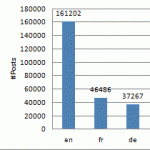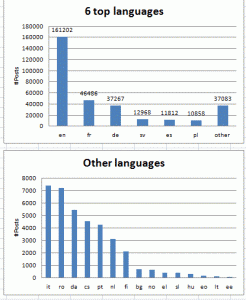EU blogging by the numbers: 317k+ posts, 21 languages
Imported from the Blogactiv.eu blogging platform, closed without warning in 2021. Links, images and embeds not guaranteed, and comments not displayed.

Data from bloggingportal.eu, extracted by BrusselsBlogger, gives some idea of the dominance of English as a blogging language on EU policy.
It is actually probably lower than most in the Brussels Bubble would guess. The headline figures and a graph follow, or just grab the data (Google spreadsheet).
Total blogs currently followed: 1116
Of this a good number are inactive - regularly pinging blogs for activity should be in my specs for the BloggingPortal reboot.
Total posts curated since 2009: 317676
It would be interesting to investigate further - e.g., how this and the previous figure have evolved over time. Unsurprisingly, only around 500 of these were manually submitted - i.e., they were not published by a blog 'followed' by Bloggingportal.
Linguistic diversity
Just over 50% of the posts were published in blogs classified as English.

Original link
Bloggingportal does not currently classify individual posts by language. If a multi-author, multi-lingual blog is classified 'English' when it's entered into the system, all posts from that blog will be classified (and displayed as) 'English', no matter what language they're written in. The reboot will tackle this via automatic language detection.
The next five languages accounted for almost 38% (graph, top): French (14.6%), German (11.7%), Swedish (4.1%), Spanish (3.7%) and Polish (3.4%). The remaining 11.7% - some 37000 posts - were classified as one of another 15 languages (graph, bottom). Make of this what you will, but I for one am surprised by the sheer volume, particularly given the fact that the entire thing was done purely on volunteer labour.
Related reading
More Stuff I Think
More Stuff tagged bloggingportal , multilingualism , bloggingportal2 , publicsphere , social media
See also: Communication Strategy , Content Strategy , Online Community Management , Social Media Strategy , Content Creation & Marketing , Social Web , Media , Politics , Communications Strategy